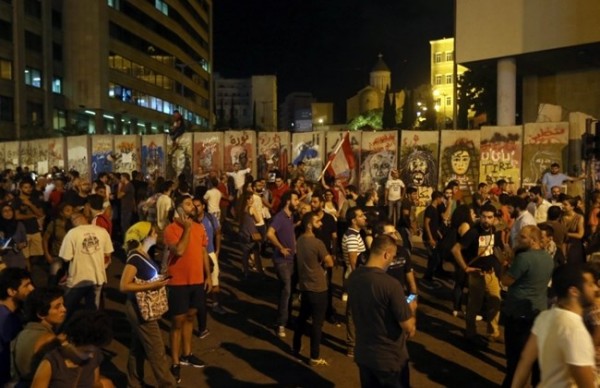
By ZEINA KARAM, Associated Press
It took a garbage crisis for Lebanon to finally snap.
Anger about the heaps of trash accumulating in Beirut’s streets boiled over this week with thousands protesting in the street against a government so dysfunctional it can’t hold elections or pick a president, much less deliver basic services.
While surviving the Arab Spring and neighboring Syria’s civil war relatively unscathed, tiny Lebanon could find itself plunging into renewed chaos if further violence tears across the capital. And its politicians, many of them warlords from the country’s own brutal 15-year civil war, may be sweating through the end of this long, hot Arab summer.
“It shows the Lebanese society to some extent catching up with the rest of the Arab world in terms of popular protests against the central government,” said Rami Khouri, a senior fellow at the Issam Fares Institute at the American University of Beirut.
In many ways, Lebanon never got over its civil war, which raged from 1975 until 1990. Some of the country’s aging warlords passed on their power to their sons and relatives. Consecutive governments neglected to improve the country’s infrastructure, leading to chronic water shortages and electricity cuts even now, 25 years after the war ended.
These longstanding grievances erupted after the government closed its main landfill Aug. 17, offering Beirut no alternative site. Mountains of garbage piled up on the streets, prompting a grassroots protest movement calling itself “You Stink.”
Decades of putting up with bad governance and corrupt politicians exploded at once. The “You Stink” movement, a rare, non-political people’s movement, quickly picked up supporters and expanded its demands beyond just the trash in the street: It demanded the resignation of the entire government.
Lebanon’s government operates a power-sharing system that supposedly ensures equal representation between the country’s Muslim and Christian sects. That often leads to incessant bickering and cronyism among the country’s politicians.
The country has been without president for more than a year, despite nearly 30 attempts by parliament to pick a new one. Parliament twice has extended its term without elections, though it isn’t working because some lawmakers insist on electing a president first.
The “You Stink” protests, which began as peaceful demonstrations, turned violent this weekend. A small group of young men repeatedly tried to tear down a barbed wire fence separating the crowds from the Lebanese government building, which houses the prime minister’s office and the Cabinet.
On Saturday and Sunday night, police fired tear gas and water cannons at the protesters, battling them in the streets of Beirut in dramatic clashes. Sporadic gunfire could be heard in the street. The two days of chaos wounded dozens.
On Monday, workers swept up broken glass and the burned remains of the violence on the street.
“We arrived in the morning and found everything broken; chairs on the floor; everything is a mess,” said Joseph Khoury, who works at a car rental agency.
Protesters blame thugs for the weekend violence, saying political operatives infiltrated their demonstrations.
“Those who did this do not represent the Lebanese people,” said Salah Noureddine, one of a handful of people protesting Monday morning.
The “You Stink” movement also says it will not back down.
“This movement has succeeded in reawakening the Lebanese, and we will not let them make us go to sleep again,” said Marwan Maarouf, a group representative.
Speaking to journalists, Maarouf called for a large protest Saturday. He said the aim continues to be “toppling an entire corrupt political class.” But such a move risks plunging the country into an even greater power vacuum and instability, further straining a country’s fragile financial system already inundated with Syrian war refugees.
AP

Leave a Reply
You must be logged in to post a comment.